MARAWI CITY —– Living and fending families from one disaster to another is a burden among women, but the survivors of Marawi siege are not losing hope as the Coronavirus pandemic is again blocking their way toward economic recovery.
Three years after surviving the war, more women, especially mothers are now against a tough invisible war — the COVID19 pandemic. Being repeatedly displaced by disasters did not cripple them to find means in order to survive. This time, they are sewing facemasks and sell it to earn.
These 32 courageous women who used to belong to Marawi’s underground economy selling goods in Barangay Padian at the center of Marawi City, to help their families in Barangay Timbangan, a village adjacent to Marawi’s Most Affected Area (MAA).
These women have been internally displaced after the war, and, temporarily sheltered through the government’s relocation facilities. Some of them even stayed for a while in an evacuation center before finding a more comfortable place for their family.
They too form part of the thousands displaced by the siege, and most of them were coming from the most affected area.
In March 2018, residents of the non-affected areas, including Barangay Timbangalan, were allowed to go back to their homes.

But life was not the same for them.
They struggled financially because businesses were not normally operational.
“We were told by our barangay chairman to organize as cooperative so that we can join a seminar for some livelihood activities. There were three groups who got listed for a seminar with the MARADECA; one group to train for farming, another for cooking while our group was for dressmaking,” said Tahira Aragasi who stands as the manager and the master cutter of the group.
Maradeca is a non-government organization coined for Maranao People Development Center, Inc., which organizes livelihood training also peace and conflict mapping analysis.
Aragasi’s group, named as Timbangalan Women’s Association, started with 20 members. Now, the association grew to more than 30 members and they are into dressmaking.
Many of them, according to Aragai used to tailor clothes even before the siege, while others were trained through the Maradeca’s technical training.
The grant
The group started a dressmaking cooperative selling traditional and artistic Moro dresses through a 200,000 Php ($3,941 USD) grant from the Office of the Presidential Adviser on the Peace Process (OPAPP), the partner agency of MARADECA.
The group spent the capital as a start-up and bought sewing machines and oter materials needed for the project.
Their product has been recognized by local and tourist which prompted them to increase the production which spelled profit to them.
They tailored special dresses for the sultan’s enthronement and for princesses and sold it for 4,000 to 7,000 pesos. Some dresses were for rent.
Earning is just one thing for them, the most significant gain for them is they feel economically and socially empowered.
Anisah Dima, 60, widow, from Timbangalan, used to toil their parcel of land has found sewing a good venture, this after she decided to stop farming since her body can no longer endure in the farm.
She endured learning how to sew and now, she is enjoying it.
During the pandemic
When the coronavirus pandemic hit the Philippines, the women’s livelihoods were greatly affected.
Due to social distancing measures and the ‘no mass gathering’ protocols, women were unable to keep their business running as normal.
The village where they live is quite isolated, and, they were unable to access the face masks and hand sanitizers they needed.
While they received cash aid from the government’s social amelioration program (SAP), it was not enough as most of the families had five to seven members of the family.
With a leftover stock that MARADECA gave them, the women decided to use the fabric they had before the crisis struck and they began stitching together for face masks.
“May mga tulong na natanggap pero hindi sapat kasi kailangan pang bumili ng gatas at diaper ng anak. Lalo na at Ramadan, kailangan ng maraming pagkain,” Aragasi noted.
(There are assistance (food packs) we received but it was not enough because we still have to buy some needs for the family like milk and diaper for the baby and we need more foods for the Ramadan.)
Orders coming
The masks they made have been certified by the Department of Health (DOH).
Aragsi posted her first face mask on social media as a locally trusted business, orders for their masks started coming in.
The first order they received was from the Army’s Civil-Military Battalion who ordered 200 pieces that were distributed to their personnel.
“Then the LGUs (local government units) in Lanao del Sur ordered more for their frontliners. It was a big help for us to survive during the pandemic,” Aragasi said.

MARADECA
MARADECA’s chief executive officer Salic Ibrahim said Timbangalan is one of the eight barangays in Marawi City they supported.
While they consulted the beneficiaries on what kind of livelihood they prefer to engage, the organization has to prepare them by giving them training.
“Before we give them the projects, they should have training on how to sustain it. They must be prepared especially in terms of business ideas, to change their mindset to be able to sustain their business,” Ibrahim said.
But because of the pandemic, Ibrahim said he is afraid that the income they have earned before the outbreak was already spent for their daily needs. Besides, he also noted that more women members did not receive any from the SAP funds.
Ibrahim said if there are businesses that failed during the pandemic, Maradecawill find a way to help them recover.-Divina Suson
